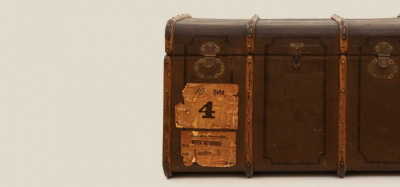 THE PROMISED LAND: FREUD’S DREAM OF ENGLAND
THE PROMISED LAND: FREUD’S DREAM OF ENGLAND
Lecture in German by Liliane Weissberg
Keynote at the symposium FREUD AND THE ÉMIGRÉ: Austrian Émigrés and Exiles and the Legacy of Psychoanalysis in Britain from the 1930s through the 1970s
Welcome by Monika Pessler, director of the Sigmund Freud Museum
Opening remarks by Daniela Finzi & Elana Shapira (in German)
Thursday, November 8, 2018, 6 p.m., Sigmund Freud Museum, Berggasse 19, 1090 Vienna
Admission free, please register below
The Promised Land: Freud’s Dream of England (in German)
Sigmund Freud had a complicated, if not critical relation to Austria and particularly to Vienna. Like many Viennese Jews of his time he considered England in contrast as an admirable democracy. Freud’s older brothers lived in Manchester, whom he would visit only once in 1908. Yet, Freud practiced his English and often quoted from English Literature. He named one of his sons after Oliver Cromwell and allowed his youngest daughter Anna to travel to England in July 1914. When Freud decided to emigrate to London, he journeyed to a foreign land which he had already considered as familiar and could not really become a place of exile; for the question of loss, memory and imaginative construction, which influenced Freud’s psychoanalytic work, resurface precisely in his relation to England. A country that towards the end of Freud’s life would be destined to offer not only to the psychoanalyst but further psychoanalytic associations a new and at the same time foreign-familiar place – the longed-for, imagined but ever to remain impossible homeland.
Liliane Weissberg is Christopher H. Browne Distinguished Professor of Arts and Sciences and Professor of German and Comparative Literature at the University of Pennsylvania. Her research interests include German literature and philosophy from the late 18th century to the early 20th century and German-Jewish studies. Weissberg has taught as a Visiting Professor at numerous universities in the United States, Germany, Switzerland, and Austria, and has curated exhibits in Germany and the United States, including the Jewish Museum in Frankfurt/M and the German Literary Archives in Marbach. Among her recent book publications are: Affinität wider Willen? Hannah Arendt, Theodor W. Adorno und die Frankfurter Schule, Frankfurt 2011; Über Haschisch und Kabbalah. Gershom Scholem, Siegfried Unseld und das Werk von Walter Benjamin, Marbach 2012; Juden. Geld. Eine Vorstellung, Frankfurt 2013; Münzen, Hände, Noten, Finger: Berliner Hofjuden und die Erfindung einer deutschen Musikkultur, Graz 2018; Nachträglich, grundlegend: Der Kommentar als Denkform in der jüdischen Moderne von Hermann Cohen bis Jacques Derrida (with Andreas Kilcher), Göttingen 2018. She is also the author of numerous essays on the history of psychoanalysis and Sigmund Freud, and she is an honorary member of the Psychoanalytic Center in Philadelphia. Weissberg is the recipient of multiple awards, including a prize from the American John Simon Guggenheim Memorial Foundation, and the German Humboldt Research Award for her life’s work.
The event is the opening of the symposium FREUD AND THE ÉMIGRÉ. Austrian Émigrés and Exiles and the Legacy of Psychoanalysis in Britain from the 1930s through the 1970s
Panel Talks: Friday, November 9, 2018, 10:00 am – 6:45 pm at the Sigmund Freud Museum, Berggasse 19, 1090 Vienna
With Elana Shapira, Louis Rose, Michal Shapira, Werner Michler, Lisa Silverman, Laura Marcus, Régine Bonnefoit, Mitchell Ash and Friedrich Stadler. For more information click here …
Concept by Elana Shapira, University of Applied Arts Vienna, FWF project leader “Visionary Vienna: Design and Society 1918-1934” & Daniela Finzi, research director of the Sigmund Freud Museum
